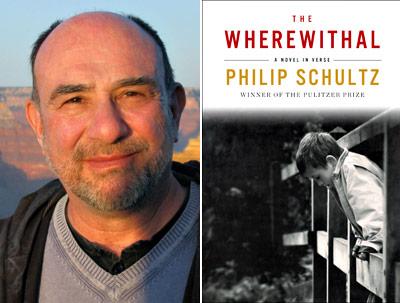Clerk of Closed Files, Department of One

What follows is an excerpt from the poet Philip Schultz’s new “novel in verse,” more than 10 years in the making and due out from W.W. Norton in February. In it, a young man hides from the Vietnam draft by changing his name ever so slightly and going to work in obscure drudgery in the basement office of a Bay Area social services agency. He keeps himself busy, in part, by translating his mother’s diaries having to do with a 1941 slaughter of Jews by their Polish neighbors.
Mr. Schultz, who runs the Writers Studio in New York and lives in East Hampton, won a Pulitzer Prize in 2008 for his collection of poems “Failure.”
‘The Wherewithal’
By Philip Schultz
1
Upstairs,
It’s San Francisco 1968 April 17
and every day the world spins faster on its axis,
a little more off-kilter,
a little less in its right mind,
bursting at its seams with desire for variation,
while everyone everywhere around me
appears to be fornicating
in doorways and on rooftops,
in spiraling parks under transplanted palms
beside rhododendron beds,
marching and waving fists
in wheels of sweltering air,
hurrying in every direction
possessed of an overflowing innocence
and furious resolve
and revolutionary zeal — indeed —
hurling themselves
against barricades of forlorn ideals
and ancient decrees,
throwing off rusty shadows
and leafy inane inner beings,
singing unholy penitential psalms
full of righteous sorrow . . . yes,
forgiving nothing
while remembering everything . . .
while I, one
Henryk Stanislaw Wyrzykowski,
Head Clerk of Closed Files,
a department of one,
work,
for the time being,
in a hole in the earth
hiding from the US Army,
from a vast personal history
of defeat and occupation,
of anger and despair,
among other things,
work,
in a forgotten well of ghostly sighs,
where, more often than not,
it’s Poland 1941 June 25
and in the town of Jedwabne
a great massacre is taking place
and the world has stopped in its tracks.
2
I wish I could say I possessed the wherewithal
(like Ludwig Wittgenstein) to regard
my thoughts as mere remarks
that can be condoned and trusted,
rather than footnotes,
or facsimiles of actual thoughts,
which when pushed
“against their own inclination”
become the scattered dependents
of an orphaned mind,
who, basically,
want nothing more to do with me.
In other words,
despite enjoying a mere half-life —
no wife, girlfriend, family or friends —
I remain (to myself at least)
somewhat “interesting,”
more than a quickly passing blur
blending lizard-like into the gray air
as I sneak down hallways,
hiding in the frayed inside pocket
of a nervous suit jacket,
my wallet and keys,
avoiding those whom only recently
I was counted among,
the odious odiferous crowding the halls,
offices and urine-stained lobbies
of this mercy depot,
this fortress of dolor,
whom I’m now employed to serve,
and who therefore see me
for what I am — guardian of nobody,
solicitor of nothing,
unnatural ferryman lugging a cargo
of dissolute souls
from one hostile shore to another
for no reason other than
to sustain myself to the next paycheck . . .
3
Leaning all the way back
in a swivel chair, cradling my aching head,
my recycled cowboy boots crossed
on a small mountain of files assigned
for further procrastination,
further dubiousness,
in a clearing wide enough for a desk,
two chairs, a rancid water cooler,
four phones, three battered filing cabinets,
a splintered two-fanged coatrack,
and a poorly framed etching
of the spectacular dungeon gloom
of Giovanni Battista Piranesi’s Carcere,
with Arches and Pulleys
and a Smoking Fire in the Center,
nailed to a cinderblock wall,
all of which now is swaying
under the cracked illumination
of a dusty street window
that permits a paltry sliver view
of mostly fancy shoes heading west
along Bush Street in posh downtown San Francisco,
not to mention, ten hissing fluorescent lamps
clinging to angry ceiling shadows
like metallic arachnids casting
a sulfuric gloom over a forest
of 1,000 sq. miles of floor-to-ceiling
metal shelves stuffed to bursting
with 700,640 inactive files
recording every sort of grievance,
indignity and plea for sustenance
suffered in the Bay Area between
September 23, 1968 and July 15, 1959
when such documentation was first evaluated,
filed, and quickly forgotten
in this branch of
the California Department of Social Services,
in whose bomb shelter of a basement
I now sit snug as a bug,
my pulse a strong breeze,
a steady 15 knots
on the Beaufort Wind Scale.
